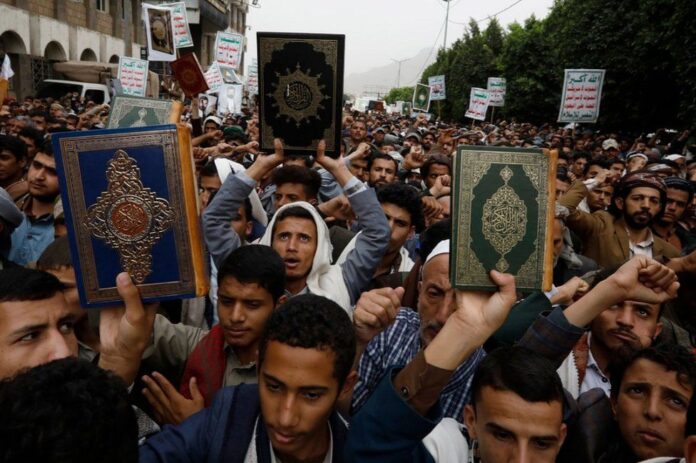In recent days, several Muslim-majority countries have been shaken by the burning and desecration of the Quran, the holy book of Islam. The incidents, carried out by far-right groups in Denmark and Sweden, have sparked widespread condemnation and protests, highlighting the deep offense and anger caused by such acts.
On Monday, a group calling themselves the “Danish Patriots” burned a Quran outside the Iraqi embassy in Copenhagen. The act, which was livestreamed on Facebook, involved two protesters stamping on the sacred book and setting it ablaze alongside an Iraqi flag. In response, Iraq and other Muslim nations expressed strong condemnation, with Iraq’s foreign ministry cautioning against the spread of “extremism and hate” that threatens peaceful coexistence among societies.
This was not the first incident of its kind. Last week, a similar act of Quran burning was planned in Stockholm, Sweden, resulting in crowds setting fire to the Swedish embassy in Baghdad. The Quran is revered by Muslims as the literal word of God, and any intentional disrespect or damage to the holy book is deeply offensive to the Islamic community worldwide.
The recent Quran desecration in Denmark further ignited anger among thousands of protesters in Yemen’s capital, Sanaa, who expressed their frustration at Denmark and Sweden for allowing such acts to occur. Many Muslim-majority countries, including Turkey, Algeria, and Iran, also voiced their strong disapproval and took diplomatic measures to protest against the incidents.
The Danish government promptly condemned the Quran burning, emphasizing that the actions of a few individuals do not reflect the official stance of the country. They urged all parties to deescalate tensions, stressing that violence should never be the response to such incidents.

In Baghdad, security forces used tear gas to prevent large crowds from reaching the Danish embassy, underscoring the gravity of the situation. Additionally, Sweden evacuated its embassy staff from Baghdad after protesters stormed the embassy building, leading to the expulsion of the Swedish ambassador by Iraq.
The incident in Stockholm had occurred after an Iraqi Christian refugee received permission from Swedish police to burn the Quran for the second time, despite widespread protests against the act. The Swedish authorities, upholding the right to freedom of assembly, allowed the protests to proceed despite attempts to ban them.
The burning of the Quran and the subsequent reactions highlight the delicate balance between freedom of expression and the need to respect religious sensitivities. As the world continues to grapple with issues of tolerance and coexistence, it is essential for societies to engage in open dialogue and find ways to address grievances without resorting to violence or offending the deeply held beliefs of others.
The recent events serve as a reminder of the importance of fostering understanding and respect among diverse communities, as well as the need for governments and individuals to uphold the values of peace, tolerance, and religious freedom in our interconnected world.


